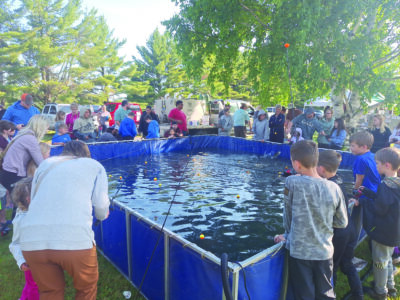Hospitals prepare for COVID-19

Photo provided by Aspirus Pictured at the screening table at the entrance of the Aspirus Laurium Clinic are employees Cindy Bonenfant (sitting) and Mariah Maggio. To help minimize the spread of respiratory infections and COVID-19, the state of Michigan now requires that all employees and patients complete a screening form prior to entering health care facilities.
LAURIUM — Local hospitals are putting protections in place and making arrangements to expand capacity for when the COVID-19 outbreak begins to impact the Copper Country.
Aspirus Keweenaw Hospital limited entrances to its hospital to either into the clinic through the retail pharmacy, or through the emergency department, said Darcy Donnelly, U.P. regional director of quality for Aspirus.
Every visitor is also being asked about recent travel or any signs of illness before they enter the building. Employees are also screened each time they enter.
“We are working with our staff as well as trying to call our patients ahead of time, or talk to them ahead of time and plan for a few minutes delay when they get to the door,” Donnelly said.
To ease capacity concerns and limit the potential spread of the coronavirus, Gov. Gretchen Whitmer also issued an executive order Friday temporarily postponing all non-essential medical and dental procedures by 5 p.m. Saturday at the latest.
Aspirus has plans in place for a surge of patients, Donnelly said. During regular status, the Laurium hospital has five intensive care beds and two operating rooms with ventilator equipment. However, as a regional hospital, Aspirus will have flex capacity to move resources within the organization to make sure facilities are properly equipped, Donnelly said.
“We’re prepared to maximize our capacity and our space,” she said. “We have different levels of planning depending on what that need is going to look like.”
How well people follow social-distancing and hygiene guidelines could determine how manageable the situation is.
In a study released through the non-profit news organization ProPublica, the Harvard Global Health Institute looked at how the novel coronavirus would stress capacity, under nine scenarios. It looked at how many hospital beds would be needed if infections were spread out over six, 12 or 18 months, and also whether 20%, 40% or 60% of the population was infected.
About a fifth of them would need to be hospitalized, according to the model. Under a conservative estimate, with a 20% infection rate spread out over 18 months, about 49.4 million American adults would become infected. That would fill 95% of hospital beds in America.
For the Marquette referral region, hospitals would need to add more beds under all but the two most optimistic scenarios – 20% infection, spread out over a year or more.
As of 2018, the Marquette area had 600 hospital beds, 54% of which are normally occupied. That includes 47 intensive care beds.
With a lower population density, only about 9% of the local population is expected to be hospitalized under the model – less than half the national rate. Still, under the moderate scenario of 40% infected over a year, the area would require 450 beds, a 64% increase.
About 18 intensive care beds are available on average, about 5.6 times less than will be needed, the study said.
The national findings highlight the importance of slowing the spread of COVID-19, researchers said.
“The way to permanently stop new cases from setting off long chains of transmission is to have each case infect considerably less than one case on average,” Marc Lipsitch, head of the Harvard T.H. Chan School of Public Health’s Center for Communicable Disease Dynamics, told ProPublica. “The numbers will go down. There will still be little outbreaks, but not big ones.”
Aspirus is collecting specimens for testing, Donnelly said. To avoid overwhelming the state testing system, tests in Michigan are being restricted to people who have had contact with a possible COVID-19 carrier and are exhibiting systems.
People over 65 or who are immunocompromised are also being prioritized for tests, Donnelly said.
About 50 people have been tested in the five-county area as of Thursday, with none testing positive, the Western Upper Peninsula Health Department said.
The Portage Health Foundation announced Friday the creation of the COVID-19 Community Recovery Fund, a restricted fund for mobilizing resources for Baraga, Houghton, Keweenaw and Ontonagon county residents for the ongoing health crisis. All funds will be used for distribution of health and humanitarian relief to residents and non-profit organizations serving the vulnerable citizens of the four-county area. Contributions can made online at phfgive.org, or mailed to Portage Health Foundation, 400 Quincy Street, Hancock, MI 49930. Donors should specify the money is going to the COVID-19 fund.
Aspirus also opened a call center on March 14 to address coronavirus concerns, available at 844-568-0701. The lines will be staffed from 8 a.m.- 5 p.m. Saturday and Sunday and 7 a.m. – 7 p.m. Monday through Friday.
It received about 100 calls on the first Saturday and Sunday, jumping to 1,000 calls on Monday, Donnelly said.
Call center operators ask about the callers’ symptoms and travel history, and based on that, advise them what to do next.
“This is normal cold and flu season and entering into the spring we’re starting to have people with questions … we’re just working through all that, helping the community stay calm, and giving them the latest and greatest information as we know it,” Donnelly said.





